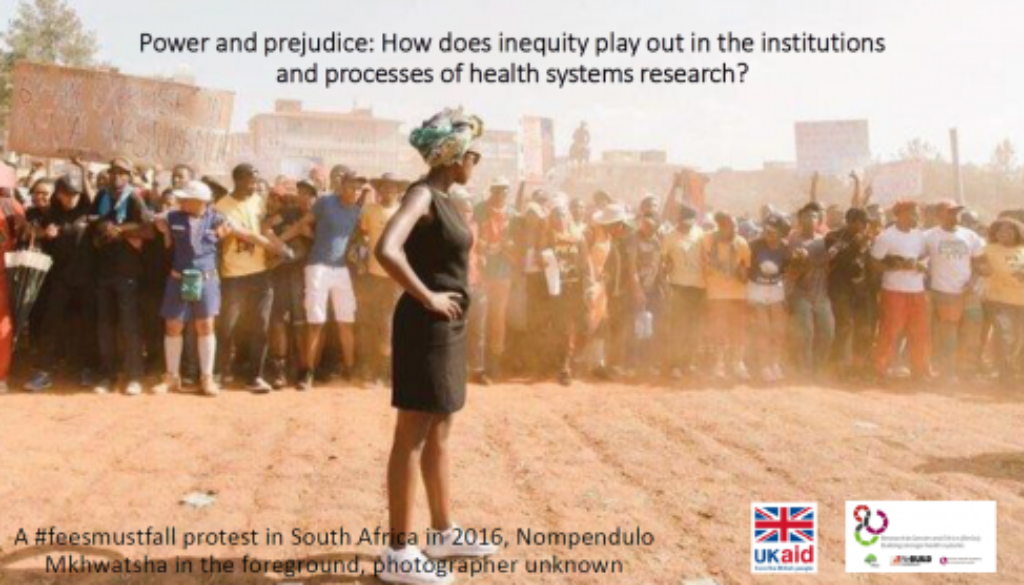Power and prejudice: How does inequity play out in the institutions and processes of health systems research?
Join us at our session on power and prejudice in health systems research at #HSR2016.
Date: Wednesday 16 November
Time: 14:00-15:30
Location: Fourth Global Symposium on Health Systems Research, Meeting Room 13
Too often inequities in terms of gender, age, class, sexuality, dis/ability, ethnicity, nationality within research systems and institutions are not the subject of enquiry. This is a platform to interrogate some of these issues and formulate strategies to overcome the persistent abuse of power and prejudice that hampers health systems research.
About the session:
Recent online campaigns like the twitter theme ‘Distractingly Sexy’ which draws attention to the reality of women’s work in science and David Hasselhoff popping up on the ‘Congrats you have an all-male panel!’ Tumblr gave us all a giggle last year. More serious campaigns like ‘Fees Must Fall’ and the top 300 Women in Global Health also help to shine a light on persistent weaknesses in our systems of knowledge generation and exchange.
It can be painful and in some cases dangerous to highlight how pervasive discrimination hampers the research effort in terms of: who gains entry into the professional world of research; who gets granted visas and gains sponsorship to attend conferences like this one which can enhance careers; whose work is supported and who has to struggle for recognition in the academy; whose non-research commitments (such as caring and domestic work) are respected and supported by their employer. But it is necessary to shine a light on these issues if we wish to do research which is fit for purpose.
In their paper, The Paradoxical Privilege of Men and Masculinity in Institutional Review Boards, Barnes and Munsch outline how gendered norms related to hegemonic masculinity shape which research is deemed worthy and how it is conducted. Understanding how these norms (and other intersecting forms of inequity) effect our practice in the field of health systems research – from the questions that we ask, to the way we collect data, through who analyses this data and to what end, and the conclusions that are drawn – is a key part of research ethics.
The purpose of this session is to work together to unpick how prejudice and power within the institutions and processes of health systems research can undermine the quality of the work that we do. It is open to those who are feeling that they have little power to make significant change in this area and those who are in a position to shake things up. Together we may discover that we have more agency that we at first think.
Moderator: Kate Hawkins, Pamoja Communications and Research in Gender and Ethics (RinGs): Building Stronger Health Systems
Discussion facilitators:
- Sarah Ssali, Makerere University and Research in Gender and Ethics (RinGs): Building Stronger Health Systems
- Sreytouch Vong, Independent Consultant and Affiliate with ReBUILD and Research in Gender and Ethics (RinGs): Building Stronger Health Systems in Cambodia
This session is co-hosted by Research in Gender and Ethics (RinGs): Building Stronger Health Systems, and Women in Global Health

